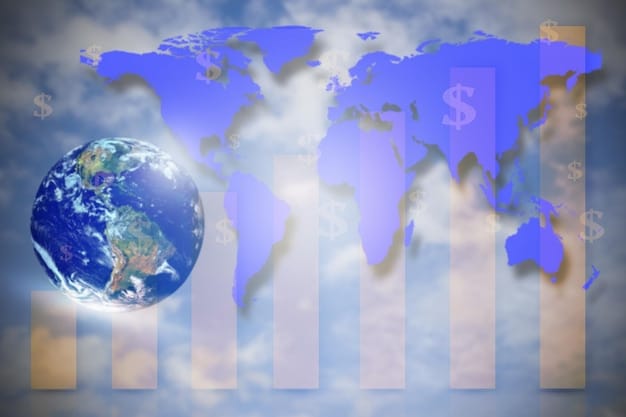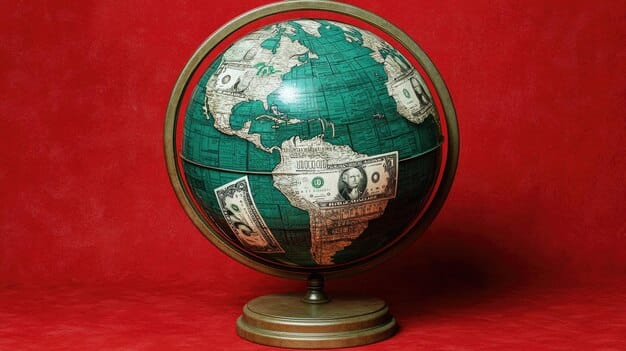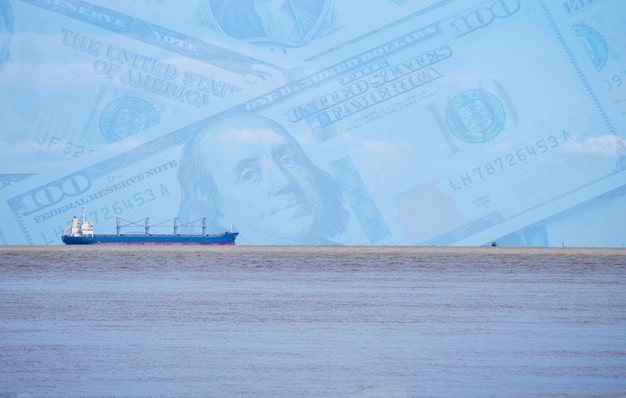US Dollar Fluctuations: Understanding Global Market Consequences

Fluctuations in the US dollar’s value can trigger a cascade of effects across global markets, influencing trade balances, investment flows, commodity prices, and the financial stability of nations, particularly those with significant dollar-denominated debt.
The **potential consequences of the US dollar’s fluctuations on global markets** are far-reaching, impacting everything from the price of imported goods to the stability of emerging economies. Understanding these dynamics is crucial for businesses, investors, and policymakers alike.
Understanding the US Dollar’s Global Influence
The US dollar holds a unique position in the global economy, serving as the world’s primary reserve currency and a dominant force in international trade and finance. Its value fluctuations can have significant repercussions across various sectors and regions.
Understanding these effects is paramount for anticipating market shifts and mitigating potential risks. Let’s delve into the key areas where the dollar’s fluctuations wield considerable influence.
The Dollar as a Reserve Currency
The US dollar’s status as the leading reserve currency means that many countries hold substantial amounts of dollars in their reserves. This demand helps to support the dollar’s value, but also exposes these nations to the risks associated with its fluctuations. A weaker dollar can erode the value of these reserves, while a stronger dollar can make it more difficult for countries to repay dollar-denominated debts.
Dollar Denominated Debt
Many countries, especially emerging economies, have borrowed heavily in US dollars. When the dollar appreciates, these debts become more expensive to service, increasing the risk of defaults and financial crises. This can lead to significant economic instability in these nations.

- Trade Imbalances: A weaker dollar can make US exports more competitive, potentially reducing trade deficits.
- Investment Flows: Fluctuations impact the attractiveness of US assets, influencing capital flows in and out of the country.
- Commodity Prices: Many commodities are priced in US dollars, so changes in its value can affect commodity prices worldwide.
In conclusion, the dollar’s global influence extends beyond simple exchange rates, impacting trade, investment, and financial stability worldwide. Its role as the dominant reserve currency and the prevalence of dollar-denominated debt ensure that its fluctuations are felt across the globe.
Impact on International Trade
One of the most direct ways fluctuations in the dollar’s value affect the global economy is through international trade. Exchange rates play a vital role in determining the competitiveness of a country’s exports and the attractiveness of its imports.
Changes in the dollar’s value can significantly alter trade balances and competitiveness across nations. Let’s explore how these fluctuations affect exports and imports.
Exports and Imports
A weaker dollar typically makes US exports more competitive in the global market, as they become cheaper for foreign buyers. This can boost US export volumes and help to reduce trade deficits. Conversely, a stronger dollar makes US exports more expensive and imports cheaper, potentially widening trade deficits.
Trade Deficits and Surpluses
Countries that rely heavily on exports to the US may experience a decline in demand when the dollar strengthens, potentially leading to larger trade deficits or smaller surpluses. The dynamics of these trade flows affect economic stability and the balance of payments.

The complexities of international trade mean that even small changes in the dollar’s value can have a ripple effect across numerous countries, affecting their trade balances and overall economic health.
Effects on Emerging Markets
Emerging markets are particularly vulnerable to fluctuations in the US dollar’s value. Many emerging economies have borrowed heavily in US dollars. This makes them susceptible to financial distress when the dollar appreciates.
The combination of dollar-denominated debt and volatile capital flows can create significant challenges for macroeconomic stability. Let’s examine the key channels through which a stronger dollar can harm emerging markets.
Dollar-Denominated Debt
As the dollar strengthens, the cost of servicing dollar-denominated debt increases for these countries, consuming a larger portion of their national budgets. This can lead to austerity measures, reduced public spending, and slower economic growth. Some countries may even face debt crises if they are unable to meet their dollar-denominated obligations.
Capital Flight
A strengthening dollar can also trigger capital flight from emerging markets, as investors seek the safety and higher returns offered by US assets. This outflow of capital can put downward pressure on emerging market currencies, further exacerbating their debt burdens and potentially leading to financial crises. The phenomenon can significantly destabilize local economies.
Inflation in Emerging Markets
A weaker local currency increases the cost of imports, potentially leading to inflation. This can erode the purchasing power of consumers and businesses, further dampening economic growth. Central banks may have to raise interest rates to combat inflation, which can further slow economic activity.
- Financial Instability: Higher debt burdens and capital flight can destabilize financial systems.
- Economic Slowdown: Increased debt servicing costs and reduced investment can slow economic growth.
- Policy Challenges: Governments may struggle to manage debt and maintain stability amid currency fluctuations.
In conclusion, emerging markets face unique challenges due to their reliance on dollar-denominated debt and exposure to volatile capital flows. Understanding these vulnerabilities is crucial for developing effective policies to mitigate the risks associated with **US dollar fluctuations**.
Commodity Price Sensitivity
Commodity prices are intrinsically linked to the value of the US dollar. Many commodities, such as oil, gold, and agricultural products, are priced in US dollars on global markets. Therefore, any change in the dollar’s value can affect how these commodities are traded and consumed worldwide.
The relationship between the dollar and commodity prices affects everything from energy costs to food prices. Let’s delve into how these fluctuations manifest and their implications.
Price Fluctuations
When the dollar weakens, commodities become relatively cheaper for buyers using other currencies. This can lead to increased demand and higher commodity prices. Conversely, a stronger dollar makes commodities more expensive for foreign buyers, potentially reducing demand and driving prices down. These changes can affect inflation and economic growth globally.
Impact on Producers and Consumers
Commodity-exporting countries may benefit from a weaker dollar as it boosts demand for their products, increasing their export revenues. However, consumers in countries with stronger currencies may face higher prices for imported commodities. These dynamics are reflected in international trade balances and economic well-being.
The inverse relationship between the dollar’s value and commodity prices means that businesses and consumers worldwide must stay attuned to these fluctuations to manage costs and plan effectively. This impacts industries ranging from agriculture to energy.
Impact on Investors Globally
The fluctuations in the US dollar have a significant impact on investors around the world. These fluctuations affect the returns on international investments, influence exchange rates, and can create both opportunities and risks in the financial markets.
How investors respond to dollar fluctuations can significantly affect their portfolio performance. Let’s explore the ways these fluctuations affect the investment landscape.
International Investments
Changes in the dollar’s value directly affect the returns on international investments. If an investor holds assets denominated in a foreign currency, the return in US dollar terms will be affected by the change in the exchange rate between the dollar and the foreign currency. A weaker dollar can boost the return on these investments, while a stronger dollar can reduce it.
Currency Hedging
To mitigate the risks associated with currency fluctuations, many investors use currency hedging strategies. These strategies involve taking offsetting positions in the currency markets to neutralize the impact of exchange rate movements on their portfolios. Currency hedging can protect investors from losses but may also limit potential gains.
Investors need to carefully consider the potential impact of **US dollar fluctuations** on their portfolios and develop strategies to manage these risks effectively. Diversification and hedging are essential tools for navigating the complexities of the global financial markets.
Geopolitical Implications
The value of the US dollar is not just an economic issue; it also has significant geopolitical implications. The dollar’s status as the world’s primary reserve currency gives the US considerable influence in international affairs. Fluctuations in its value can affect geopolitical power dynamics and diplomatic relations.
These influences can affect the balance of power and diplomatic relations. Let’s explore the critical geopolitical implications of these economic shifts.
Economic Sanctions
The US can use its control over the dollar to impose economic sanctions on other countries. By restricting access to the dollar, the US can effectively isolate these countries from the global financial system. This can be a powerful tool for achieving foreign policy objectives, but it can also have unintended consequences and strain diplomatic relations. The use of sanctions is a topic of ongoing debate.
Global Power Dynamics
A weaker dollar can reduce US economic and geopolitical influence, as other countries may seek to reduce their reliance on the dollar and promote alternative currencies. This could lead to a more multipolar world, with several competing economic and political centers of power.
- Geopolitical Stability: The dollar’s stability can influence international relations and stability.
- Diplomatic Leverage: The US can use the dollar’s dominance to exert diplomatic pressure.
- Trade and Investment: The dollar’s value can affect trade agreements and investment decisions.
In conclusion, the US dollar’s fluctuations have far-reaching geopolitical implications, affecting everything from economic sanctions to global power dynamics. Understanding these implications is crucial for policymakers and investors alike.
| Key Point | Brief Description |
|---|---|
| 🌍 Global Trade | Dollar shifts impact export competitiveness and trade balances worldwide. |
| 💰 Emerging Markets | Dollar strength increases debt burdens & risks capital flight from vulnerable economies. |
| ⛽ Commodity Prices | Dollar value affects prices of commodities like oil and gold globally. |
| 📈 Investor Impact | Currency moves affect international investment returns and hedging strategies. |
FAQ Section
▼
A weaker dollar makes US exports cheaper for foreign buyers, potentially increasing demand. A stronger dollar has the opposite effect, making US goods more expensive and potentially reducing exports.
▼
Emerging markets often have significant dollar-denominated debt, making them vulnerable. A stronger dollar can make it harder to repay those debts, increasing the risk of financial crises.
▼
Many commodities are priced in US dollars globally. A weaker dollar can make commodities relatively cheaper for buyers using other currencies, potentially increasing demand.
▼
The returns on international investments can be directly affected. A weaker dollar can boost returns on investments denominated in foreign currencies, while a stronger dollar can reduce them.
▼
The US can use its control over the dollar to impose economic sanctions. Fluctuations in its value can also affect global power dynamics and diplomatic relations between countries.
Conclusion
In summary, the **potential consequences of US dollar fluctuations on global markets** are multifaceted and far-reaching. These fluctuations impact international trade, emerging markets, commodity prices, investors, and even geopolitical relationships. Understanding these dynamics is critical for businesses, investors, and policymakers aiming to navigate the complexities of the global economy.





